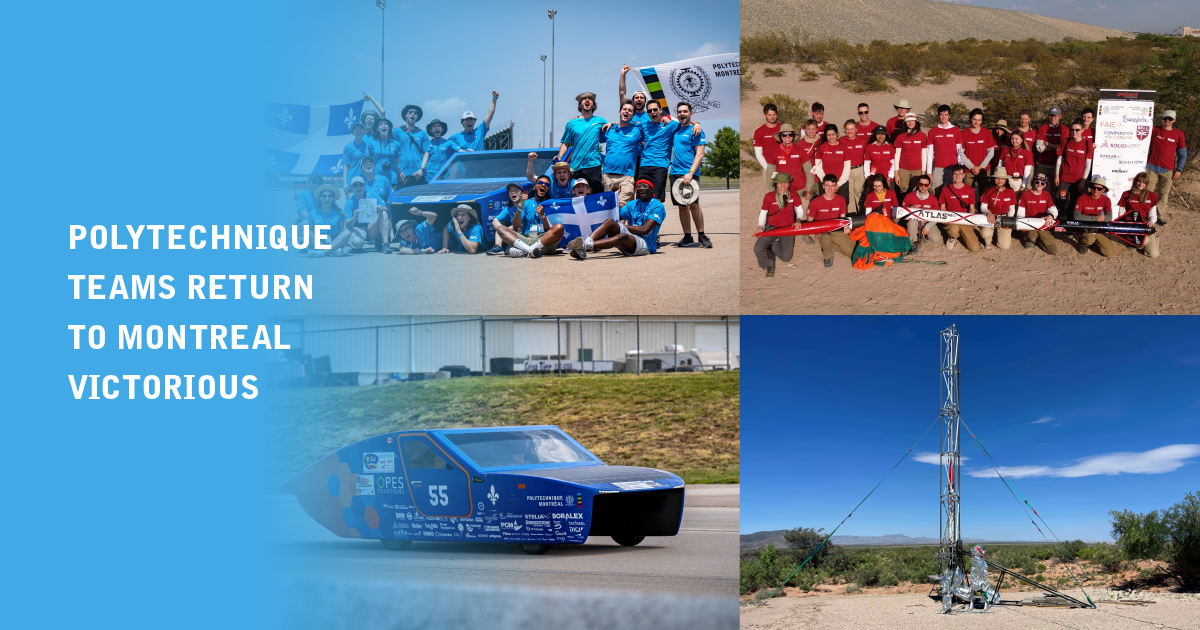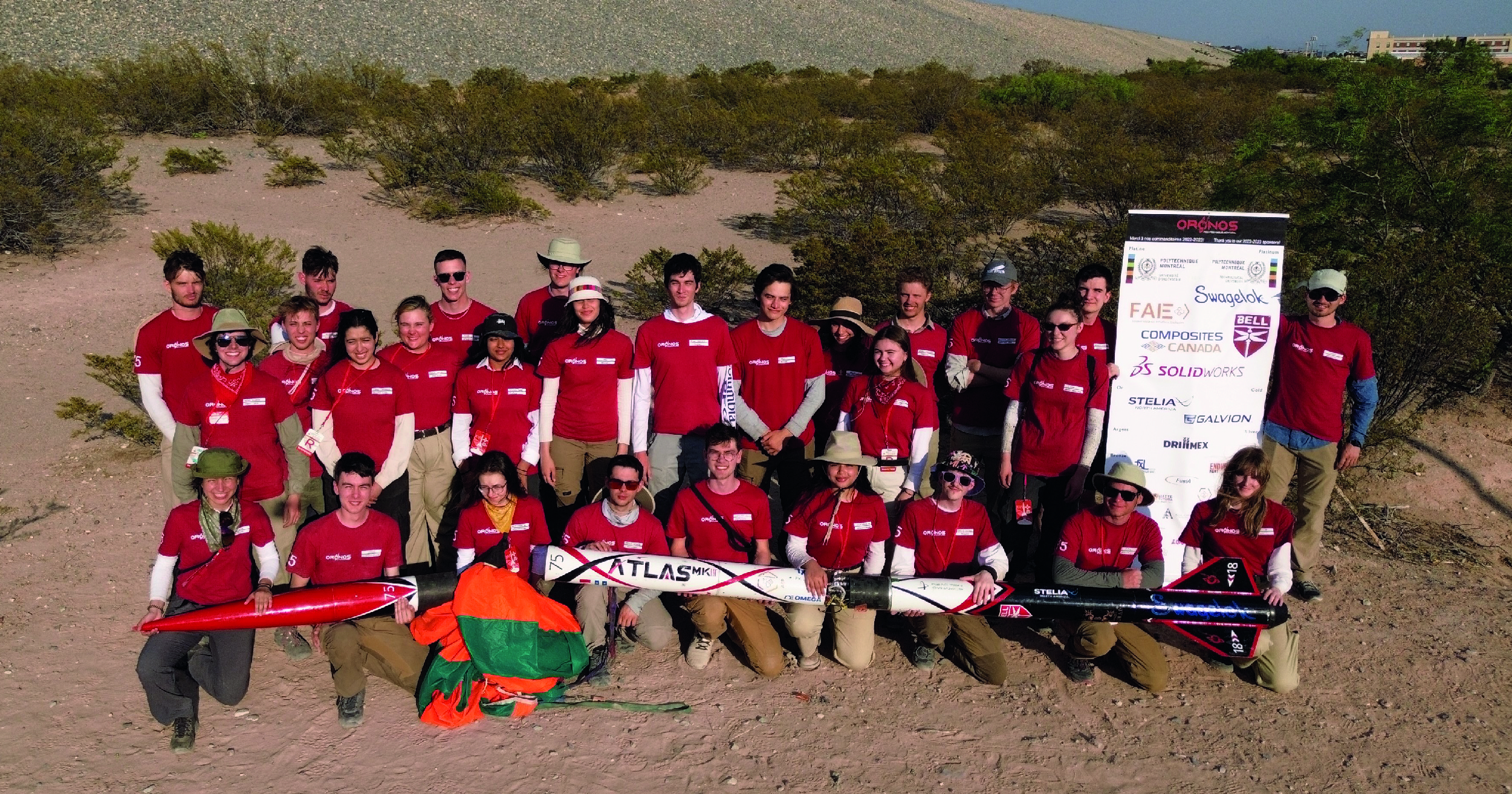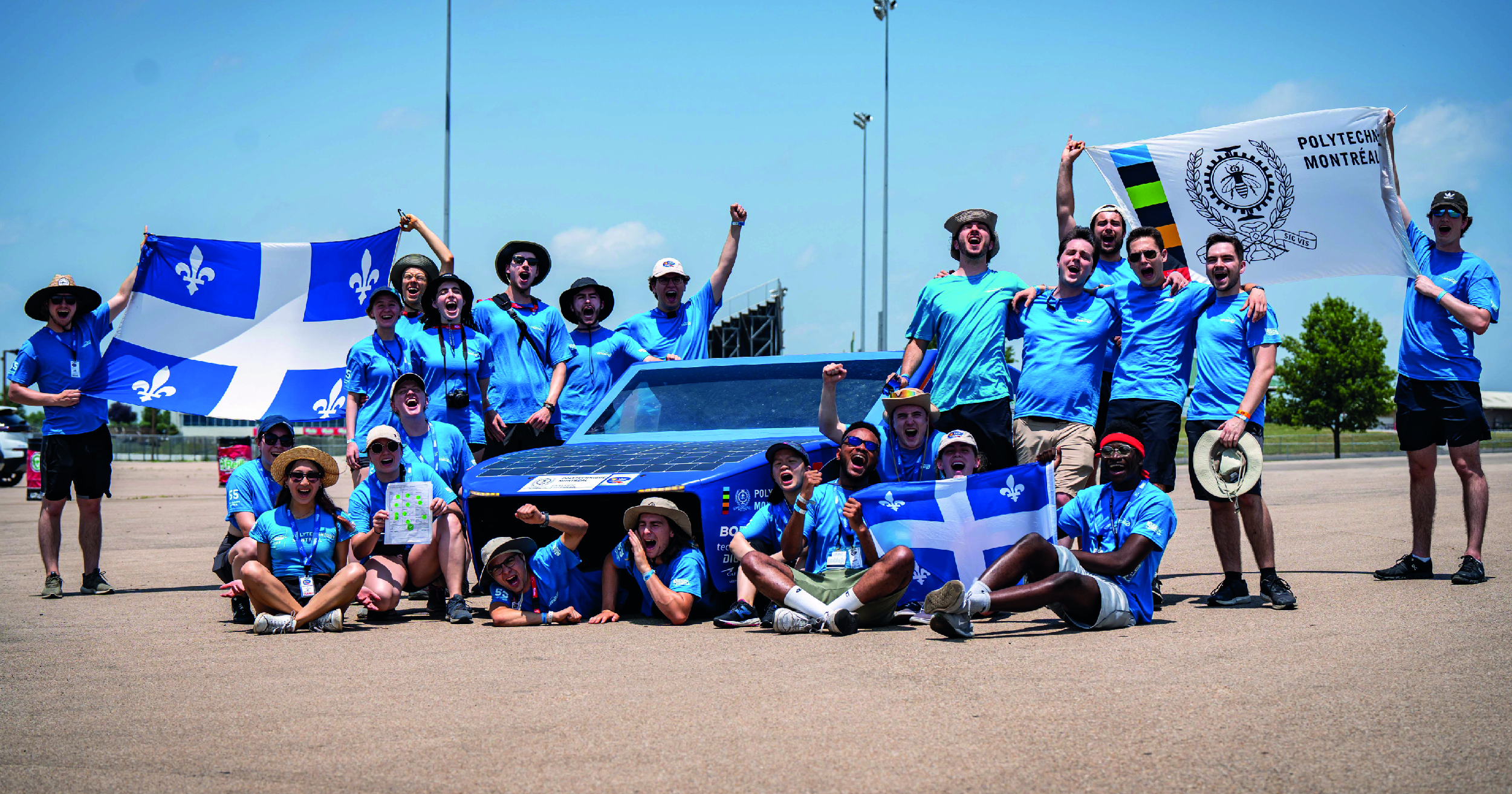Dazzling victories for Oronos and Projet Esteban at major rocketry and solar car competitions!

Montréal, August 9, 2023 – The Oronos and Projet Esteban technical teams won the day again in the United States, taking first place in the Spaceport America Cup and the Electrek Formula Sun Grand Prix with their experimental hybrid rocket and solar car prototype. Polytechnique Montréal students unveiled sustainable technologies, confirming their leadership in sustainable engineering.

Oronos’s Atlas MK III hybrid rocket
Members of the Oronos technical team once again made their mark by taking home top honours at the 2023 Spaceport America Cup, the prestigious international rocketry competition held from June 18 to 24 in the New Mexico desert. For the third year in a row, Oronos won first prize in the “10K Hybrid/Liquid Rocket-Student Research and Developed Components” category.
The goal of the competition is to propel a rocket carrying a scientific payload to an altitude of 10,000 feet (3,048 m) or 30,000 feet (9,144 m) as accurately as possible. Rockets were launched from the Spaceport America Gateway to Space terminal, the first commercial space centre in the world. More than 150 student teams from universities and colleges in 24 countries attended the event held by the Experimental Sounding Rocket Association, a U.S. organization with the mission of fostering and promoting engineering knowledge and experience in the field of rocketry.
This year, Oronos was proud to present the Atlas MK III rocket (10,000 feet), version 3.0 of the Atlas MK II, which gave a stellar performance in 2022. This rocket is powered by a hybrid engine (simultaneously liquid and solid) entirely designed by the team. This engine made Oronos the first Québec team to develop, launch and recover a hybrid engine entirely developed by a group of students.
Technical details — ATLAS MK III
Rocket powered by a hybrid engine designed entirely by the team:
- Hybrid engine: Hades V3
- Maximum Mach: 0.69
- Maximum acceleration: 4.49 G
- Length: 165 inches (4.2 m)
- The goal of the rocket’s payload was to polymerize a smaller version of a telescope lens in microgravity and observe the lens quality after the rocket’s flight.

Copyright: Oronos Polytechnique
“Oronos is very proud to have once again soared to great altitudes to earn a spot on the podium,” says Rose Malenfant-Poulin, Oronos Co-Team Lead and undergraduate aerospace engineering student. “We are thrilled to be part of the Canadian university aerospace community, which is a very high-performing and supportive group. This new victory is a boost of confidence for the team and we definitely feel ready to take on more complex projects with the goal of reaching new heights.”
The Oronos committee has 50 active members, 40% of whom are women, in several engineering specialties: mechanical, computer, software, aerospace, physics and chemical.
Aiming higher to achieve sustainability
In recent years, Oronos has undertaken several sustainable development-related projects. In 2022, the team implemented a system that uses solar panels to power its equipment and computers, as well as the rocket’s electrical system, prior to flight. The team is also researching the use of composites and biosourced materials. It wants to analyze the life cycle of rocket manufacturing to determine the environmental impacts with the goal of establishing a bank of CO2 emissions equal to Oronos’ current activities.
Projet Esteban’s solar-powered car
After three days of technical inspections, followed by three days of racing on a closed-circuit track, the Projet Esteban team triumphed once again at the Electrek Formula Sun Grand Prix held from June 27 to July 2 in Topeka, Kansas. Students took home awards for fastest drag race, best electric design, and Spirit of the Event.
Esteban 10 is Polytechnique Montréal’s first two-seater solar vehicle prototype. Several weight and space optimizations were required to make the car net more energy efficient than other vehicles in its category. With battery capacity of just 9.2 KWh, Esteban 10 has a range of up to 700 km.

Copyright: Cora Kennedy
“Above all, participating in an engineering competition like the Electrek Formula Sun Grand Prix is an opportunity to push our limits and showcase our achievements,” says Laure Jalbert-Drouin, Projet Esteban Co-Director and undergraduate mechanical engineering student. “That’s why we work so hard all year. But it’s also an opportunity to interact and develop strong ties with a community of students all over North America who share our passion.”
Projet Esteban, which has approximately 50 active members from several engineering specialties, including mechanical, aerospace, electrical, computer, software, physics, mining and industrial, includes 30% women, 60% sit on the executive.
Full throttle toward sustainability
By using solar—a clean energy source—to power its technology, the Projet Esteban team’s goal is to showcase the efficiency of renewable energy to a wide audience.
The committee is moving full speed ahead to further reduce its environmental footprint throughout the entire process of designing and manufacturing its prototype. They use materials that offer the lightest weight and highest performance. But these are the most difficult to recycle. To reduce the environmental impact of using these technologies, the team has focused on ways to re-use them, such as selling the frame and other vehicle components to other universities, re-using electrical and mechanical systems between prototypes or even using obsolete materials from major companies.
Projet Esteban members are aware of the environmental footprint of participating in the Formula Sun Grand Prix and want to quantify the greenhouse gases emitted by the project during both the competitions in the summer of 2022 and the 2022-2023 university academic year. Students have partnered with NatureLab.World in an effort to compensate for the emissions and make Esteban a carbon-neutral project.
About Polytechnique Montréal
Founded in 1873, Polytechnique Montréal is one of Canada’s largest engineering education and research institutions. It is located on the Université de Montréal campus, the largest French-language university campus in the Americas. With more than 59,000 graduates to date, Polytechnique has educated over 22% of the Ordre des ingénieurs du Québec’s current membership. Polytechnique offers about 120 programs taught by more than 300 professors, and welcomes close to 10,000 students yearly. It has an annual operating budget of $300 million, including a research budget of $100 million.
-30-
MEDIA KIT – VIDEOS AND PHOTOS
- Oronos (28 Mo)
- Projet Esteban (1 Giga)
- Photo of the August 9, 2023 event (credit: Thierry du Bois)


